
Pohela Boishakh, the vibrant celebration of the Bengali New Year, is set to grace the calendar on Wednesday, April 15, 2026 . This joyous occasion marks the beginning of the year in the Bengali lunar calendar, ushering in a fresh start filled with hope, prosperity, and the promise of new beginnings. The day is celebrated with grandeur, bringing together people from all walks of life in a spirited display of cultural traditions, delectable foods, colorful attire, and infectious enthusiasm. As the sun rises on Pohela Boishakh, communities come alive with rituals, music, and festivity, all aimed at welcoming the new year with open hearts and minds.
Festival Date, Time, Muhurat & Tithi
Bengali Era 1433 Begins
Pohela Boishakh on Wednesday, April 15, 2026
Pohela Boishakh marks the first day of the Bengali New Year as per the Bengali lunar calendar.
Key Timings for Pohela Boishakh 2026:
Sankranti Moment on Pohela Boishakh - 09:39 AM, Apr 14
Note : Sunrise and sunset vary by region and date due to India's geographical diversity. For exact timings, refer to local astronomical data.
Significance & Importance of Pohela Boishakh
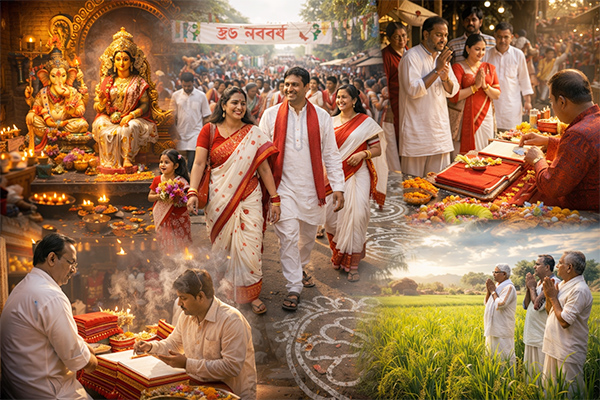
Pohela Boishakh is one of the most revered and significant festivals for the Bengali community, marking the first day of the Bengali New Year. Celebrated with fervor across the Indian subcontinent, especially in Bengal, it is not only a cultural but also a spiritual event. Pohela Boishakh is considered a day of renewal, symbolizing the commencement of new beginnings filled with hopes for prosperity and happiness. It is a time when the Bengali people come together in a collective celebration of life, expressing gratitude for the past and welcoming the opportunities of the new year.
At the heart of the Pohela Boishakh celebrations lies a deep spiritual significance. The day is seen as an auspicious occasion to seek blessings from divine forces. Many devotees visit temples of Goddess Lakshmi, the goddess of wealth, and Bhagwan Ganesha, the remover of obstacles, to offer prayers and seek their blessings. The offerings and prayers on this day are believed to bring peace, good fortune, and prosperity throughout the year. For individuals and businesses alike, Pohela Boishakh represents an opportunity to invoke divine favor for success and growth in the months ahead.
In addition to spiritual observances, Pohela Boishakh is an important day for those in the agrarian and commercial sectors. Farmers, who depend on seasonal harvests, offer special prayers for a bountiful crop. They seek blessings for favorable weather and fruitful yields. On the other hand, those in business mark the start of the new fiscal year by performing the ritual of Haal Khaata, which involves opening new account books to ensure the financial prosperity of their ventures. This act is symbolic of fresh starts, offering a chance to clear past debts and set new financial goals for the year ahead.
Family and social bonds are strengthened through the exchange of heartfelt well-wishes and the sharing of festive foods. People adorn themselves in new clothes, often in bright, vibrant colors, to symbolize new beginnings. Special meals are prepared, featuring traditional Bengali dishes, and the joy of togetherness fills every home. Whether in large gatherings or intimate family celebrations, Pohela Boishakh brings people closer, reinforcing the cultural unity and collective spirit of the Bengali community.
Overall, Pohela Boishakh is not just a festival; it is a time of reflection, renewal, and celebration. It stands as a reminder of the cyclical nature of life, where every ending gives way to a new beginning. Through its rich customs, prayers, and festivities, the festival fosters a sense of hope, togetherness, and the desire for a prosperous future for all.
History of Pohela Boishakh Festival
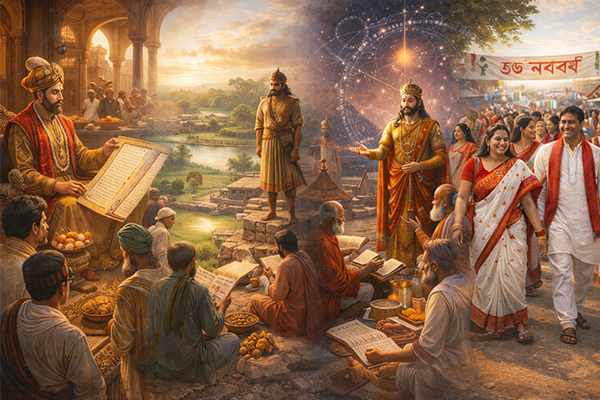
The origin of Pohela Boishakh is deeply rooted in history and folklore, with several theories surrounding its beginnings. One of the most widely accepted accounts traces the festival back to the Mughal era during the reign of Emperor Akbar. According to popular belief, Akbar faced challenges in collecting taxes from peasants due to the mismatch between the Islamic lunar calendar and the agricultural harvest season. The Islamic calendar, followed by the Mughals, did not align with the time when the harvest would typically occur. To address this issue and ensure more efficient tax collection, Akbar ordered the merging of the Islamic lunar calendar with the Hindu solar calendar. This adjustment gave rise to Pohela Boishakh, as it aligned the new fiscal year with the harvest season, making it easier to collect taxes after the crops were gathered.
While this theory is widely acknowledged, there are other legends that trace the origins of Pohela Boishakh to earlier periods. Some accounts attribute the creation of the Bengali calendar to King Shashanka, a 7th-century ruler of Bengal. According to this legend, Shashanka established the calendar, marking the beginning of the Bengali New Year. Another popular belief, especially among Bengali Hindus, is that the festival’s roots go back to Emperor Vikramaditya, who is said to have instituted the Bengali calendar in 593 CE. These varying legends reflect the rich and diverse history that Pohela Boishakh represents.
In modern times, the official date for the celebration of Pohela Boishakh was fixed as April 14 in 1987. However, the date can vary slightly each year, depending on the Bengali calendar, which is based on lunar and solar cycles. For the year 2026, Pohela Boishakh will be celebrated on April 15, marking the first day of the Bengali New Year and continuing the traditions that have been passed down through centuries.
Regardless of its historical origins, Pohela Boishakh today is celebrated with immense enthusiasm and is an important cultural event for the Bengali community. It is a time of renewal, reflection, and hope, carrying forward the legacy of its historical significance while embracing the vibrant celebrations that have become an integral part of the festival.
How to celebrate Pohela Boishakh
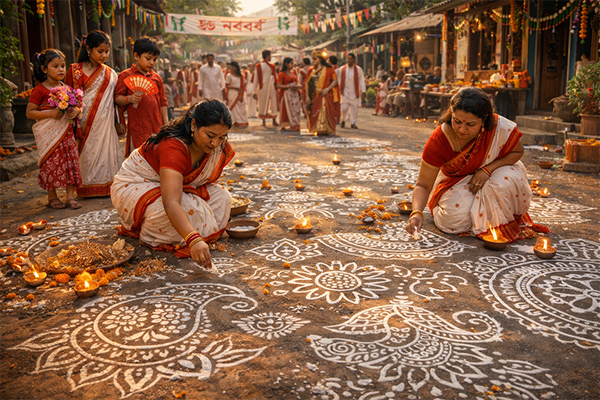
Pohela Boishakh, the celebration of the Bengali New Year, is a festival that brings people together in a riot of colors, joy, and vibrant traditions. One of the most iconic customs of this day is the creation of intricate 'alpona' designs, a form of traditional artwork similar to rangoli. These beautiful patterns are drawn with rice paste and are typically placed outside homes and shops to welcome the new year with positive energy and good fortune. The designs often feature motifs of flowers, animals, and other elements of nature, adding to the festive atmosphere of the day.
On this auspicious occasion, cleaning and tidying up homes is a key ritual. Bengalis believe that a fresh start to the new year should be accompanied by a clean and purified environment. After cleaning, families often wear new clothes, symbolizing a fresh beginning and the casting away of any past negativities. Bright, vibrant colors dominate the clothing choices, with men typically donning kurta-pajamas and women wearing sarees or salwar kameez, often in hues of red, white, and gold.
Spiritual observances also play a significant role in the celebrations. Many people visit temples dedicated to Goddess Lakshmi, Bhagwan Ganesha, or other deities, to offer prayers for prosperity, wealth, and the removal of obstacles. Others choose to perform rituals at home, creating altars or conducting pujas for their families and loved ones. The act of praying and offering sacrifices is deeply rooted in the belief that invoking divine blessings on this day will ensure good fortune for the coming year.
In addition to the religious practices, Pohela Boishakh is a time for family gatherings and socializing. Friends and relatives come together to exchange warm greetings, with a customary phrase being 'Shubho Noboborsho' (Happy New Year). Visiting loved ones and sharing meals further strengthens the bonds of kinship. Food plays a central role in the celebration, with traditional Bengali dishes being prepared and shared. These often include sweets like 'rossogolla' and 'mishti doi' (sweetened yogurt), along with savory dishes such as 'shorshe ilish' (hilsa fish cooked in mustard) and 'panta bhat' (fermented rice).
The sense of community is amplified through various public events and processions that take place during the festival. People participate in vibrant processions, accompanied by music, dance, and songs that highlight the cultural richness of Bengal. Traditional folk music, such as Baul songs, and performances of Rabindra Sangeet (songs by Rabindranath Tagore) are commonly heard, adding to the festive spirit.
One of the major attractions of Pohela Boishakh is the Boishakhi Mela, a large fair that begins on the day of the celebration and continues for several days. The fair is a bustling hub of activity, with an array of colorful stalls selling a wide variety of goods. From local food delicacies to agricultural produce, cosmetics, and jewelry, the fair offers something for everyone. For children, the fair is especially exciting, as it features rides, games, and other amusements that draw large crowds. Cultural performances, such as dance recitals, folk performances, and drama shows, are often staged to entertain visitors, allowing them to immerse themselves in the cultural fabric of Bengal.
To celebrate this holy festival, Bengalis prefer to opt for traditional attires in their regional colours of red and white. Women can be seen wearing white sarees white a red border or a salwar-kameez in this colour scheme. Men typically wear kurta pyjama or lungi to celebrate this occasion. Children also wear traditional attire in bright colours to celebrate this festival. Additionally, women and children also use colourful accessories such as flowers in their hair, bangles, and other ornaments to dress up on this day.
Pohela Boishakh is not only a day of spiritual and familial significance, but also a celebration of Bengali culture, tradition, and togetherness. It reflects the values of renewal, community bonding, and the joy of life, as people come together to mark the arrival of a new year, filled with optimism and hope for a prosperous future.
Pohela Boishakh Puja Vidhi (Puja Procedure)
_203459.jpg)
Pohela Boishakh, the Bengali New Year, is a significant occasion in Bengali culture, marked by various religious and cultural celebrations.
The Puja procedure for Pohela Boishakh begins early in the morning, with devotees gathering to offer their prayers to Bhagwan Ganesha, Goddess Lakshmi, and other deities for a prosperous and happy year ahead.
The ritual begins with the devotees cleaning and purifying the space where the puja will be performed. They set up a clean altar, placing an image or idol of Bhagwan Ganesha, who is worshipped for removing obstacles, and Goddess Lakshmi, the goddess of wealth and prosperity, along with other sacred items like flowers, incense, a bell, a conch, and a diya (lamp).
The next step is the chanting of mantras, often beginning with 'Om Gan Ganapataye Namah,' while offering flowers and sweets to the deities. The priest, or the family member leading the ritual, may perform aarti, circling a lighted lamp around the deities, as the devotees offer prayers and seek blessings for a successful year ahead. After the offerings, the devotees usually perform a short prayer for their health, wealth, and well-being, invoking the blessings of the divine powers.
The final part of the Puja involves a simple distribution of prasad (sacred offerings), usually consisting of sweets and fruits, which are shared with family and friends as a mark of goodwill and prosperity.
The ritual is also a time for people to clean and organize their homes, symbolizing a fresh start for the new year. It is a joyful occasion marked with family gatherings, traditional foods, and cultural programs. The Puja, steeped in devotion and tradition, symbolizes renewal, prosperity, and the celebration of life.
Pohela Boishakh Puja Mantras
The mantras used during Pohela Boishakh Puja is often focused on Bhagwan Ganesha and Goddess Lakshmi, invoking blessings for the new year.
'Om Gan Ganapataye Namah'
This mantra is dedicated to Bhagwan Ganesha, the remover of obstacles, and is recited to seek his blessings for a smooth and successful year ahead.
'Om Shreem Mahalakshmiyai Namah'
This mantra invokes the blessings of Devi Lakshmi, asking for prosperity, wealth, and happiness in the coming year.
These mantras are typically chanted during the offering of prayers and while performing the aarti in the Pohela Boishakh Puja.
Pohela Boishakh Vrat Vidhi (Fasting Procedure)
_203461.jpg)
The Pohela Boishakh Vrat (fasting) is an integral part of the celebration of the Bengali New Year, where devotees observe a day of fasting and spiritual practices to invite prosperity and good fortune in the coming year. The fasting begins early in the morning, often after taking a ritual bath, symbolizing cleanliness and purification. It is believed that starting the day with a bath removes any negative energies and helps one embrace the new year with a fresh and positive mindset.
Devotees then set an intention for the fast, often praying for health, wealth, and happiness for themselves and their loved ones. The fast is typically observed by consuming only fruits and water throughout the day, abstaining from cooked food, grains, and other heavy meals. Some may choose to perform a partial fast, consuming only liquids such as milk, coconut water, or fruit juices. The fast is meant to purify the body and mind, and it is also a way to demonstrate devotion and discipline.
Throughout the day, people may engage in prayers, chanting mantras, and offering their respects to Bhagwan Ganesha and Goddess Lakshmi, seeking their blessings for the upcoming year. The day’s spiritual activities are often accompanied by visits to temples or home pujas.
In the evening, after the fast is broken, devotees partake in a simple meal, which may include traditional Bengali dishes like sweets, fruits, and rice preparations, as part of the celebration. The fast is seen as a way to purify oneself, create a connection with divine energies, and begin the new year with a renewed sense of purpose and devotion.
Pohela Boishakh Vrat Katha (Traditional Fasting Story)
_203460.jpg)
The Pohela Boishakh Vrat Katha (Traditional Fasting Story) is a significant part of the celebration of the Bengali New Year and is believed to have roots in both religious and cultural practices. According to the tradition, the fasting story revolves around the belief that observing a fast on the first day of the Bengali New Year brings blessings from Goddess Lakshmi and Bhagwan Ganesha, ensuring prosperity and success in the coming year.
One version of the story relates to the legend of King Shashanka, who ruled over Bengal in ancient times. It is believed that King Shashanka introduced the tradition of celebrating the first day of the Bengali year as a time for renewal, prosperity, and devotion. During his reign, the people of Bengal would observe a fast to honor the gods and seek their blessings for a bountiful harvest, peace, and prosperity in the kingdom. The king also instructed the people to perform rituals and offer prayers to Goddess Lakshmi, the goddess of wealth, and Bhagwan Ganesha, the remover of obstacles, as a way to ensure success and happiness for the coming year.
Another version of the fasting story involves a tale of Lakshmi Mata, who once decided to leave the earth because of a lack of devotion from the people. The gods and sages, alarmed at the potential loss of prosperity, advised the people to fast and perform rituals on the first day of the year, praying to Lakshmi to return and bless the earth with wealth and happiness. When the people began fasting and observing the rituals with devotion, Lakshmi was pleased and decided to bless them with prosperity, abundance, and good fortune for the year ahead.
The Pohela Boishakh Vrat Katha teaches devotees the importance of fasting as a way to purify the mind and body, while also deepening one's spiritual connection. It emphasizes the significance of devotion, self-discipline, and gratitude for the divine blessings that sustain life. Through the observance of this fast and the chanting of mantras, the devotees seek not only material wealth but also spiritual growth and harmony in their lives. The story is a reminder of the importance of faith and reverence in the process of renewal and celebration.
Puja Utensils, Essentials
Rudra Centre brings an extensive collection of Puja Articles which caters to all that is required for daily and special Puja Vidhis. We offer variants of designs and sizes in each category. The list includes handcrafted Puja Mandirs, Puja Pedestals, offering Bowls, Panchpatra, intricately carved Puja Thalis, Abhishek Vessels, in different materials, Pure Silver/German Silver articles like Kalash, set of Shodash Upachara and Several other Puja Articles, which we deliver at your doorstep.
Lakshmi Ganesha Puja For Success in Career
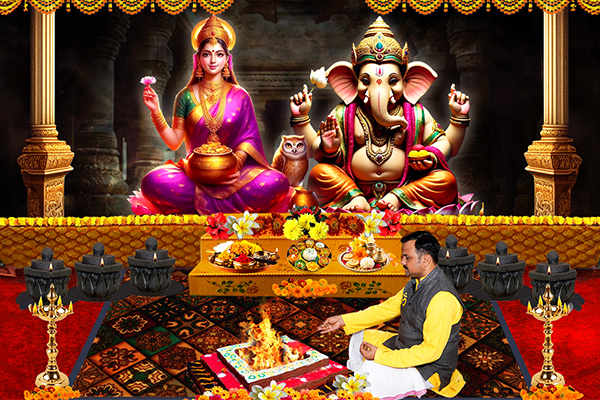
Lakshmi Ganesha Puja For Success in Career is ideal for those looking for a new job and for promotion in job. Bhagwan Ganesha and Goddess Lakshmi are worshiped together to usher in wealth, prosperity, wisdom and intelligence. No Puja or celebration is complete without invocation of Bhagwan Ganesha, He is the God of wisdom, knowledge, learning and good fortune. Bhagwan Ganesha is also the remover of obstacles and thus is also known as Vighnaharta. Goddess Lakshmi is the Goddess of wealth, prosperity and abundance. They are worshipped together in this puja that brings success in profession.
Rudra Centre Puja Services is the oldest and most trusted Online Puja Services provider in the world. Over 20 years we have organized Yagnas, Pujas, Homas and Kathas like Ati Rudra Mahayajna, Sahasra Chandi Homa, Akhand Ramayan Paath, Shiva Maha Puran Katha, 4 Prahar Mahashivratri Mahapuja with teams of 100’s of curated priests for the benefit of mankind and our global clientele.
Shree Laxmi Ganesh Yantra
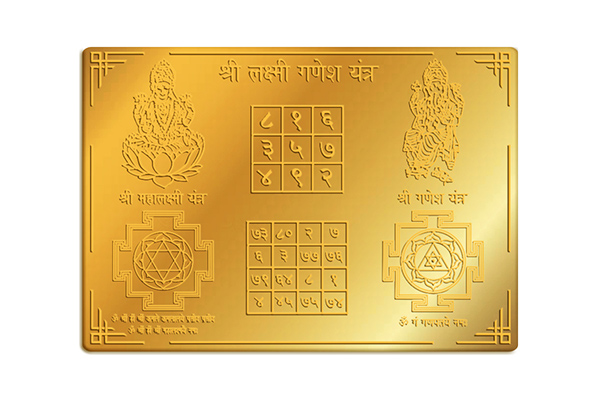
The Laxmi Ganesh Yantra combines the blessings of Goddess Laxmi, the deity of wealth, and Bhagawan Ganesh, the remover of obstacles. When used and worshipped devoutly, this yantra is believed to bestow numerous significant benefits. The Laxmi Ganesh Yantra is believed to bring wealth and good luck. It aids in overcoming financial barriers and boosting wealth, making it a vital tool for those pursuing economic stability and success in their endeavors. This yantra bestows blessings for well-being and harmony. It fosters positive energy, promotes unity, and resolves domestic conflicts, contributing to a peaceful and balanced family life.
Conclusion
Pohela Boishakh is not merely the celebration of the Bengali New Year but a profound spiritual observance that marks the renewal of life, bringing with it an opportunity for growth and transformation. This sacred day serves as a reminder of the power of devotion, purity, and righteousness. Through fasting, prayers, and the performance of puja rituals, devotees reconnect with the divine presence of Bhagwan Ganesha and Lakshmi Devi, seeking their blessings for prosperity, health, and success. The rituals of this day emphasize self-discipline, clarity of purpose, and an alignment with the higher spiritual truths that govern the universe. It is a time to reflect on the past year, seek forgiveness for any misdeeds, and prepare for a fresh start, guided by the values of truth, integrity, and devotion to the divine.
As sacred mantras are chanted and offerings are made, the atmosphere becomes charged with divine energy, invoking the blessings of the gods for a prosperous and fulfilling year. The observance of Pohela Boishakh reminds us that true success is not measured by material wealth alone, but by spiritual growth, inner peace, and the cultivation of virtues such as kindness, generosity, and humility. The devotion shown during this celebration helps deepen one’s connection to the divine, reinforcing the belief that faith, dedication, and alignment with dharma are the true sources of strength in overcoming life’s challenges. Thus, Pohela Boishakh becomes not just a festival of joy and prosperity but a moment of profound spiritual reflection, urging us to live with purpose and to seek divine guidance in every aspect of life.


-in-Astrology.jpg)
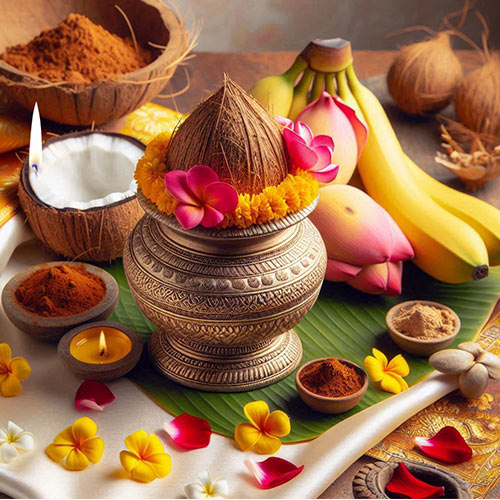
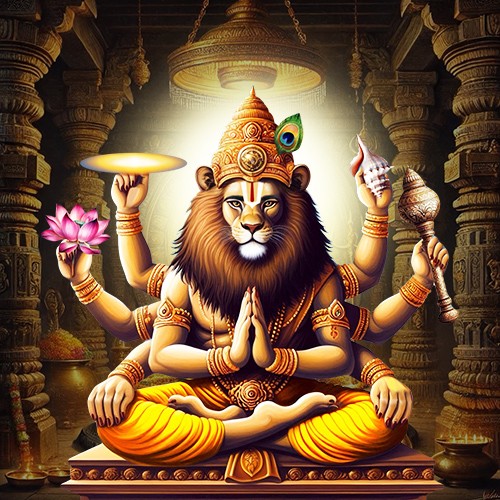
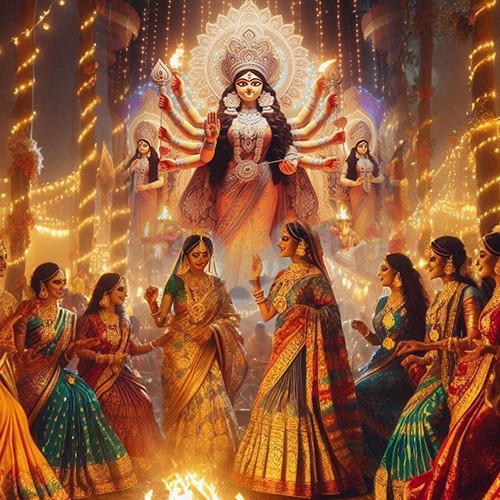


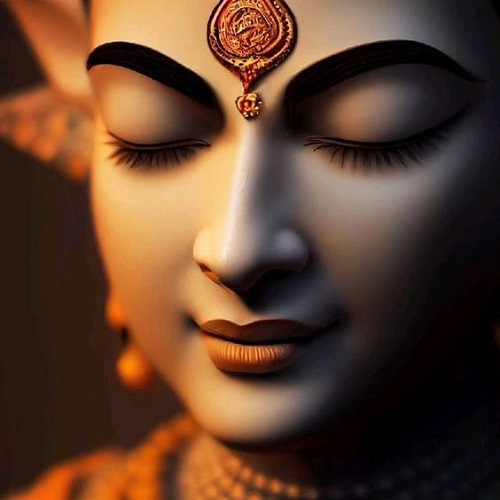
.jpg)
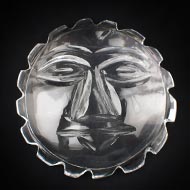
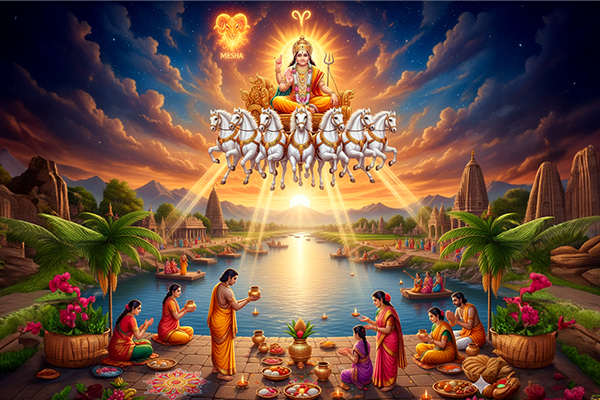
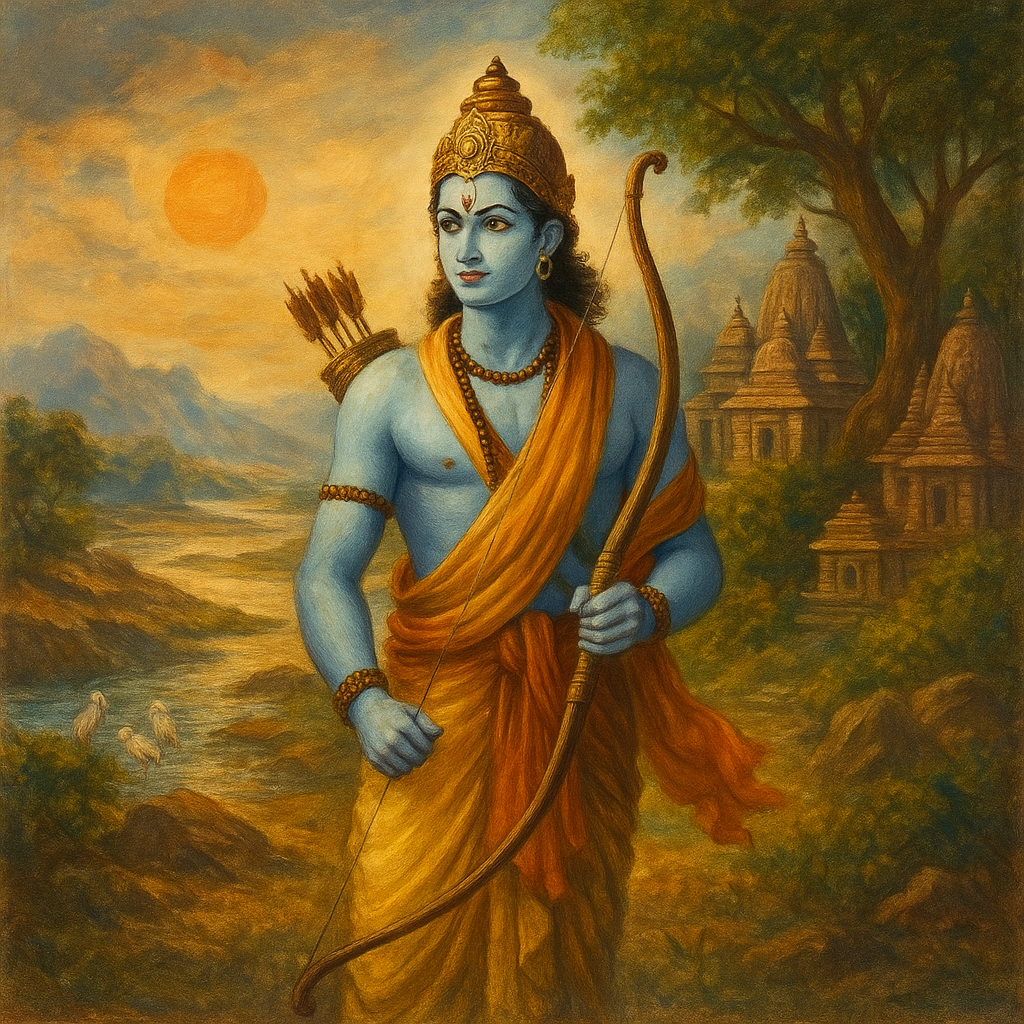
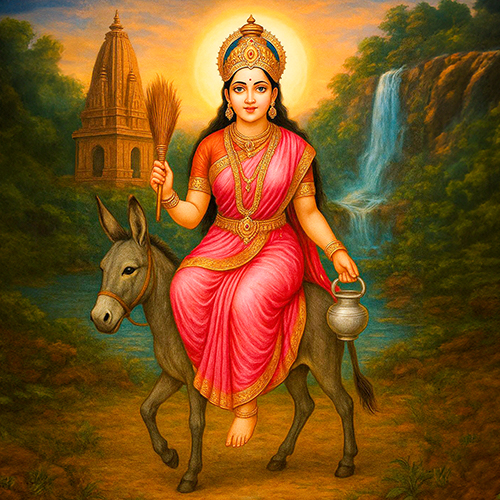
Comments 0
Leave your thought here